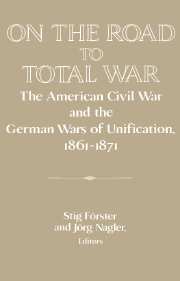Book contents
- Frontmatter
- 1 Introduction
- Part One Basic Questions
- 2 Was the Civil War a Total War?
- 3 The American Civil War and the German Wars of Unification: The Problem of Comparison
- Part Two Nationalism, Leadership, and War
- Part Three Mobilization and Warfare
- Part Four The Home Front
- Part Five The Reality of War
- Part Six The Legacy
- Part Seven Conclusions
- Index
2 - Was the Civil War a Total War?
Published online by Cambridge University Press: 05 January 2013
- Frontmatter
- 1 Introduction
- Part One Basic Questions
- 2 Was the Civil War a Total War?
- 3 The American Civil War and the German Wars of Unification: The Problem of Comparison
- Part Two Nationalism, Leadership, and War
- Part Three Mobilization and Warfare
- Part Four The Home Front
- Part Five The Reality of War
- Part Six The Legacy
- Part Seven Conclusions
- Index
Summary
In a recent article, Charles Strozier, a Lincoln biographer and co-director of the Center on Violence and Human Survival, argues that the United States' demand for unconditional surrender in World War II, and ultimately the use of two atomic bombs on Japan, found antecedents in President Lincoln's surrender terms in the Civil War.
Precedent, it might be said, is everything in human affairs. [Franklin D.] Roosevelt's inventive reading of the surrender at Appomattox draws us back into that most curious of American events, the Civil War, as the crucible in which the doctrine of unconditional surrender was forged. In this first of modern wars, a new technological capacity to kill and destroy emerged, along with a strikingly new set of ideas about military strategy, the relationship between a fighting army and noncombatant civilians, and the criteria that determine when war is over. The latter are of enormous significance and relate directly to the brutality, length, and totality of twentieth-century warfare.
The crucial term here is not unconditional surrender, a phrase perhaps coined by Gen. Ulysses S. Grant at Fort Donelson early in 1862, but the ideal of totality in war, a concept that comes from our own century. “It was Lincoln, Grant, and the Civil War that incorporated total war into modern experience,” Strozier maintains. “There is a clear connection here between the emerging nation-state, a new type of deadly warfare, and an ending in which an enemy capitulates completely. To put it epigrammatically, the totality of the modern state seems to require unconditional surrender as a necessary correlative of its total wars. The American Civil War brought that into focus.”
- Type
- Chapter
- Information
- On the Road to Total WarThe American Civil War and the German Wars of Unification, 1861–1871, pp. 29 - 52Publisher: Cambridge University PressPrint publication year: 1997
- 1
- Cited by

